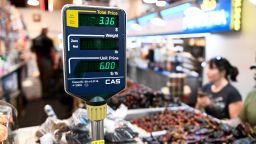Americans are feeling slightly better about the economy again, in part because they believe the worst of the latest surge in gas prices is behind them, consumer sentiment data showed Thursday.
After an initial jump in energy costs in response to the military conflict in Ukraine was felt at US pumps in March, there has been some respite.
“Retail gas prices have fallen since the March peak, and that fact was immediately recognized by consumers,” said Richard Curtin, chief economist at the University of Michigan’s Surveys of Consumers.
In early April, survey participants expected gas prices would only increase by 0.4 cents per gallon in the year ahead, a welcome retreat from the March surge of 49.6 cents.
On Thursday, the national average gas price was $4.07 per gallon, according to AAA, compared with the peak of $4.33 on March 11.
Overall, the preliminary April data from the University of Michigan’s consumer sentiment survey beat economists’ predictions of a flat reading and edged higher.
Consumer expectations improved, both in terms of the economic and personal finance outlook, the survey found.
“A strong labor market bolstered wage expectations among consumers under age 45 to 5.3% – the largest expected gain in more than three decades, since April 1990,” said Curtin.
So, while rampant inflation and Russia’s war continue to put pressure on energy and food prices, consumers are feeling as if there is a glimpse of light at the end of the tunnel.
Even so, Thursday’s data must be put in perspective.
April’s sentiment index remained below its January level, and lower than in any month in the past decade, according to Curtin. Americans may feel a little better about the economy, but not all worries are gone.
The Consumer Price Index, a key measure of inflation, rose to a fresh 40-year high in March, increasing 8.5% year-over-year. Inflation is one of the main drivers of the sentiment survey.
Meanwhile, retail sales last month took a hit as Americans spent more of their household budget at the pump.
Total retail sales grew by 0.5%, but actually fell by 0.3% when stripping out gas stations, the Census Bureau reported early Thursday.
Economists remain hopeful that March was the pandemic inflation peak, which would mean fewer price headwinds for consumers in the months to come. That said, the geopolitical pressures on prices are expected to stick around for months and could dictate if inflation might pull back and by how much. On top of that, interest rates on mortgages, car loans and credit cards are rising as the Federal Reserve continues to tighten monetary policy.
Average 30-year fixed-rate mortgage rates reached 5% for the first time since 2010 in the week ending Thursday, according to Freddie Mac.


























